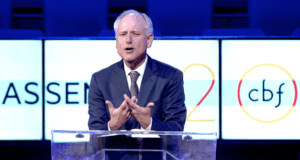
Paul Baxley preaches at the virtual General Assembly of the Cooperative Baptist Fellowship June 25, 2020.
Christians cannot remain silent about racial injustice, the leader of the Cooperative Baptist Fellowship declared June 25.
Addressing a virtual CBF General Assembly, Paul Baxley, executive coordinator, did not mince words in addressing what he called a “glaring pandemic of racial injustice that has afflicted this land for almost 401 years.”
“In this moment, I do believe the Holy Spirit is calling us to speak clearly about some things that have to change” and “calling us to repent” and “speak clearly against any kind of injustice, any form of police brutality that is based on race. We cannot remain silent,” he said.
Baxley preached to an empty room at Johns Creek Baptist Church in Atlanta but was seen across the country as General Assembly participants watched from their homes. The planned assembly in downtown Atlanta was scuttled because of the COVID-19 pandemic.
Less than 4 miles from where the assembly would have been held, Atlanta police recently shot a man to death in another incendiary event that has sparked marches and protests nationwide — despite the threat of infection from the global pandemic.
Baxley preached a sermon drawn from the story of the early Christian church and specifically the apostles Peter and John, who with boldness healed a paralyzed man and were called to give account of how and why they had done this.
“We are now stewards of the same message,” he said — a message to become “faithful stewards of a bold mission.”
This is a kind of faith that “doesn’t blend in with everything else,” Baxley said. “It’s not going to talk like government. It’s not going to look like businesses. … We need to be offering ourselves to a kind of faith that will stand out, not fit in.”
Faithful Christians today need to “invite people who have been held in bondage and captivity to rise up and walk,” he said, suggesting that might also include empowering Black-owned businesses to thrive. This is in line with the prophet Micah’s call to “do justice,” he said.
This biblical call to extend racial justice “is not a political agenda,” Baxley insisted. Instead, it “comes from the heart of the life of God. God has now given the church the ministry of honest, authentic, costly reconciliation.”
Baxley, who is completing his first full year as leader of the group that 30 years ago broke away from the Southern Baptist Convention, previously served as a pastor in Athens, Ga. He grew up in Durham, N.C., at Watts Street Baptist Church, where he recalled hearing his pastor, Warren Carr, face down the issue of racism in the 1960s.
His childhood pastor, he said, “stood in the pulpit of Watts Street Baptist Church and preached sermons that called for racial justice and healing. They didn’t go over very well. In fact, some people were so enraged that they defaced the front door of the church — at least three times.”
The first two times, the pastor had the graffiti removed. But the third time was different. “They posted a message I cannot quote,” Baxley said, but paraphrased it as “Watts Street Baptist Church loves Black people.” This third time, he remembers, the pastor “looked at the church custodian and said, ‘Leave it up because that’s the gospel.’”
Baxley concluded: Christians today must follow the witness of the apostles of old and the saints of recent years toward “a boldness that will set us apart.”
